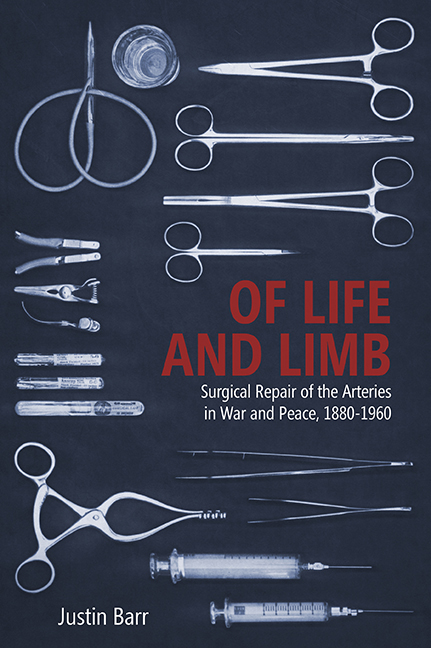 Surgical Repair of the Arteries in War and Peace, 1880–1960
Surgical Repair of the Arteries in War and Peace, 1880–1960 Of Homer's heroes hit by spears, shot with arrows, or struck by swords in The Iliad, 90 percent died, most bleeding to death on the battlefield.1 Weapons have since grown more powerful, but the importance of saving lives and limbs remains unchanged. From Homer to the present, society has asked medical practitioners to arrest the hemorrhage and restore these individuals to their pre-injured state. As doctors have learned more about blood vessels, they have also identified nontraumatic conditions, like the aortic aneurysm that killed Albert Einstein and the clogging of vessels by cholesterol that causes heart attacks and strokes, which are also amenable to structural repair. While recent pharmaceutical interventions can ameliorate some of these conditions, throughout most of history, surgery provided the only effective therapy.
This book studies the process of how surgery changes. It focuses on operations that repair blood vessels and uses them to explore broader issues such as the relationship between theory and practice; how surgical knowledge is generated, validated, and communicated; the nature of surgical authority; the mechanisms by which a particular operation becomes standard of care; and the sociocultural conditions that promote and determine change. Written to inform both historians and surgeons, Surgical Repair of the Arteries examines how doctors took care of patients suffering from vascular trauma and disease and how that management developed over the course of the late nineteenth and twentieth centuries.
At its most fundamental level, repairing arteries restores blood flow through diseased or injured vessels. Your cells need oxygen and nutrients to survive. Blood carries these life-sustaining molecules through an interconnected web of arteries and veins called the vascular system. Arteries carry oxygen-rich, nutrient-filled blood from the heart to the periphery; veins return the depleted blood back to the core for replenishment and recirculation. From superhighways like the aorta to the tortuous back roads of microscopic capillaries, this transport network reaches every corner of the human body. Disruptions to this infrastructure can prove fatal. Trauma in the form of stabbings, shootings, and explosions can sever vessels and cause death from bleeding. Dilations of arteries called aneurysms can burst, draining the entire blood supply within minutes.
To save this book to your Kindle, first ensure [email protected] is added to your Approved Personal Document E-mail List under your Personal Document Settings on the Manage Your Content and Devices page of your Amazon account. Then enter the ‘name’ part of your Kindle email address below. Find out more about saving to your Kindle.
Note you can select to save to either the @free.kindle.com or @kindle.com variations. ‘@free.kindle.com’ emails are free but can only be saved to your device when it is connected to wi-fi. ‘@kindle.com’ emails can be delivered even when you are not connected to wi-fi, but note that service fees apply.
Find out more about the Kindle Personal Document Service.
To save content items to your account, please confirm that you agree to abide by our usage policies. If this is the first time you use this feature, you will be asked to authorise Cambridge Core to connect with your account. Find out more about saving content to Dropbox.
To save content items to your account, please confirm that you agree to abide by our usage policies. If this is the first time you use this feature, you will be asked to authorise Cambridge Core to connect with your account. Find out more about saving content to Google Drive.